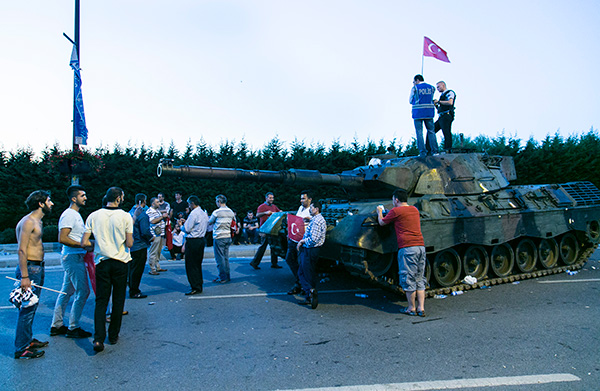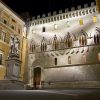The latest coup in Turkey, a country with a long history of military interventions, was the fifth since 1960, including a so-called e-coup in 1997 (the posting of an army declaration) that forced the Prime Minister to resign, and the first that failed.
The spectacular failure of a faction of the armed forces to topple the government of the autocratic President Recep Tayyip Erdoğan tells a lot about the changes in Turkey since his Islamist-rooted Justice and Development Party (AKP) came to power in 2002 and has ruled ever since.
The colonels and a few generals that staged the coup, with the loss of more than 260 lives, mostly civilians and police officers, and 1,500 people injured, did not, unlike in the other coups, enjoy the full support of the armed forces nor did it have political or public backing or that of the intelligence service.
Plotters held General Hulusi Akar, the Chief of Staff, while the Navy Chief and Special Forces Commander spoke out against the coup. The two main opposition parties, the social-democratic CHP, established by Mustafa Kemal Atatürk (an army officer), the founder of the secular Republic of Turkey in 1923, and the far-right nationalist MHP also opposed the coup, although they would dearly love to get rid of Erdoğan. Even his fiercest critics only want him removed through the ballot box.
Once Erdoğan told his supporters –the AKP won 49.4% of the vote in last November’s general election and Erdoğan 52% in the 2014 presidential election after he stepped down as Prime Minister– to go into the streets, the coup was lost (see Figure 1). Some civilians risked their lives and climbed on tanks.

The coup was the ‘hardest’ since 1980, but while that came about as a result of right-wing/left-wing armed conflicts and was generally welcomed for restoring order to a Nato member (since 1952, and with the second-largest army after the US), the one last Friday occurred in a country that has spent the last 11 years negotiating its accession to the EU, albeit with minimal success.
“Removing the armed forces from political […] was a key demand by Brussels and achieving it is regarded as one of Erdoğan’s main achievements”
Removing the armed forces from political life (the National Security Council was a kind of shadow government until it came under civilian control) and defanging their influence through a series of informal channels was a key demand by Brussels and achieving it is regarded as one of Erdoğan’s main achievements.
Erdoğan has his own reasons for taming the military, which, under the constitution, is the ultimate guardian of secularism and has long been wary of his creeping brand of Islamism. The 1997 coup removed Erdoğan’s Islamist precursor, Necmettin Erbakan.
But, as the latest events have shown, not all the military decided to return to the barracks. The plotters, mainly from the air force, seized control to ‘reinstall the constitutional order, democracy, human rights and freedoms, to ensure that the rule of law once again reigns in the country, for law and order to be reinstated’.
Turkey has become a very polarised society under Erdoğan who is loved and hated with equal measure. He has become increasingly authoritarian and is trying to turn himself into a strong executive President, but the AKP does not have the required support in parliament to change the constitution. Nevertheless, Erdoğan behaves as if he were a latter day sultan.
The President has a short fuse and does not brook criticism, be it on social media (Turkey dominates global twitter censorship) or in newspapers, radio and TV. Freedom House, the US-based democracy group, has rated the Turkish press as ‘not free’ since 2013, when the government suppressed mass protests. Turkey’s press freedom score dropped from 54 in 2010 to 65 in 2014 (0 = best; 100 = worst).
“Given Erdoğan’s intolerance of opposition, he will be sorely tempted to seek revenge on anyone deemed to have played a part in the coup”
The country is also battling terrorism perpetrated by the Islamic State (IS): 40 people died in an attack on Istanbul airport last month and suicide bombers killed 10 people in January near the famous Blue Mosque. The state is at war too with Kurdish insurgent groups, a conflict that began in the 1980s, died down and then flared up again.
The coup will further weaken the vital tourism industry (to the benefit of Spain as holidaymakers are switching to the country instead), which has already been hit by the terrorist attacks.
Given Erdoğan’s intolerance of opposition, he will be sorely tempted to seek revenge on anyone deemed to have played a part in the coup, starting with the followers of the Muslim cleric Fethullah Gülen whom he blames for creating a ‘parallel state’ that masterminded the coup. Erdoğan called the coup a ‘gift from God because this will be a reason to cleanse our army’.
The 75-year-old Gülen, a former ally of Erdoğan until they fell out in 2013, has lived in self-imposed exile in the US since 1999 (after the 1997 coup) and denies any involvement, going as far as to say that it could have been staged by the government in order to rally support. Erdoğan again demanded Gülen’s extradition.
More than 6,000 people have been detained, including high-ranking officers, and 2,745 judges dismissed. Among those arrested is General Erdal Öztürk who commanded the Third Army Corps.
The death penalty might be sought for the ringleaders on the grounds of treason, although it was abolished as part of the reforms to start EU accession negotiations. Turkey’s chances of ever joining the EU, however, are extremely slim, and probably even less now.
Erdoğan should use the coup to be magnanimous and not further divide the country, but past events have shown that this is not his style.



